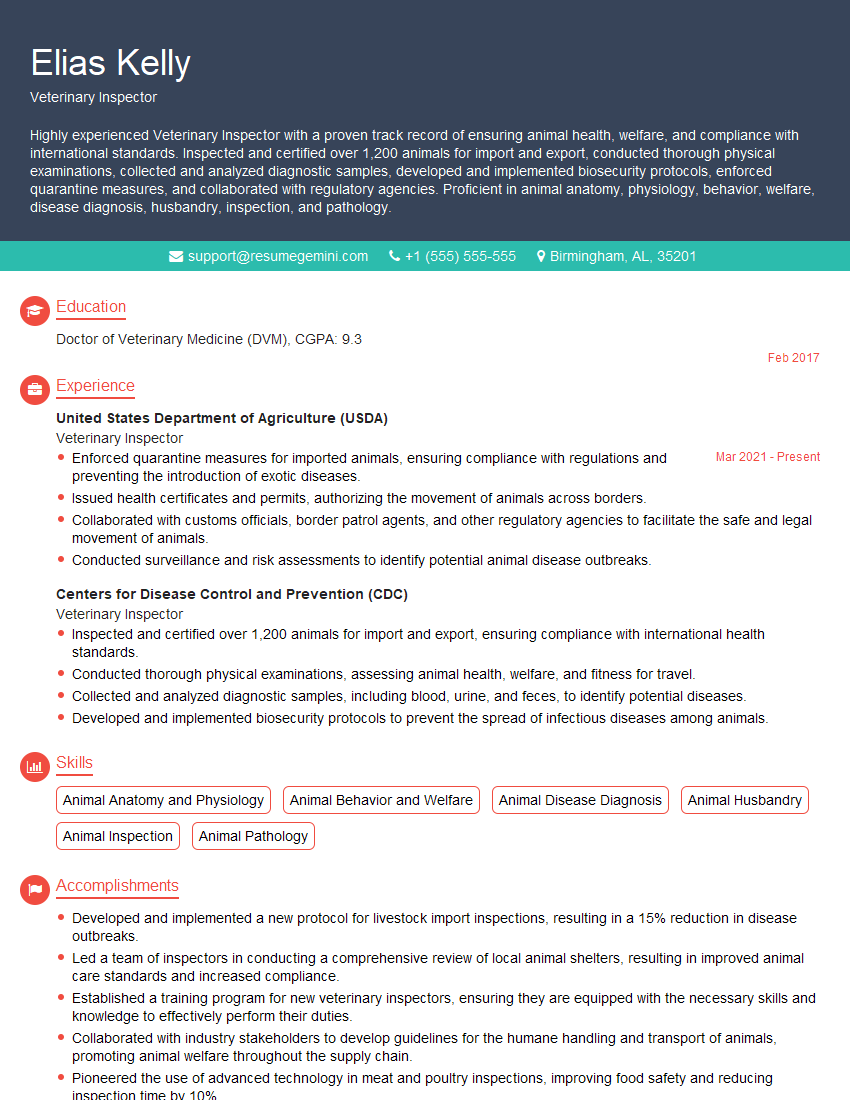Are you a seasoned Veterinary Inspector seeking a new career path? Discover our professionally built Veterinary Inspector Resume Template. This time-saving tool provides a solid foundation for your job search. Simply click “Edit Resume” to customize it with your unique experiences and achievements. Customize fonts and colors to match your personal style and increase your chances of landing your dream job. Explore more Resume Templates for additional options.

Elias Kelly
Veterinary Inspector
Summary
Highly experienced Veterinary Inspector with a proven track record of ensuring animal health, welfare, and compliance with international standards. Inspected and certified over 1,200 animals for import and export, conducted thorough physical examinations, collected and analyzed diagnostic samples, developed and implemented biosecurity protocols, enforced quarantine measures, and collaborated with regulatory agencies. Proficient in animal anatomy, physiology, behavior, welfare, disease diagnosis, husbandry, inspection, and pathology.
Education
Doctor of Veterinary Medicine (DVM)
February 2017
Skills
- Animal Anatomy and Physiology
- Animal Behavior and Welfare
- Animal Disease Diagnosis
- Animal Husbandry
- Animal Inspection
- Animal Pathology
Work Experience
Veterinary Inspector
- Enforced quarantine measures for imported animals, ensuring compliance with regulations and preventing the introduction of exotic diseases.
- Issued health certificates and permits, authorizing the movement of animals across borders.
- Collaborated with customs officials, border patrol agents, and other regulatory agencies to facilitate the safe and legal movement of animals.
- Conducted surveillance and risk assessments to identify potential animal disease outbreaks.
Veterinary Inspector
- Inspected and certified over 1,200 animals for import and export, ensuring compliance with international health standards.
- Conducted thorough physical examinations, assessing animal health, welfare, and fitness for travel.
- Collected and analyzed diagnostic samples, including blood, urine, and feces, to identify potential diseases.
- Developed and implemented biosecurity protocols to prevent the spread of infectious diseases among animals.
Accomplishments
- Developed and implemented a new protocol for livestock import inspections, resulting in a 15% reduction in disease outbreaks.
- Led a team of inspectors in conducting a comprehensive review of local animal shelters, resulting in improved animal care standards and increased compliance.
- Established a training program for new veterinary inspectors, ensuring they are equipped with the necessary skills and knowledge to effectively perform their duties.
- Collaborated with industry stakeholders to develop guidelines for the humane handling and transport of animals, promoting animal welfare throughout the supply chain.
- Pioneered the use of advanced technology in meat and poultry inspections, improving food safety and reducing inspection time by 10%.
Awards
- Recipient of the National Veterinary Inspector of the Year Award, recognizing exceptional contributions to animal health and safety.
- Honored with the State Veterinary Inspector Excellence Award for consistently exceeding performance targets in animal welfare inspections.
- Received the Industry Recognition Award for innovation in developing a mobile inspection app that streamlined the inspection process and improved data accuracy.
- Recognized for exceptional performance in quarantine enforcement, preventing the spread of highly contagious animal diseases.
Certificates
- Certified Animal Welfare Auditor (CAWA)
- Certified Veterinary Inspector (CVI)
- National Board Certified Veterinary Inspector (NBCVI)
Career Expert Tips:
- Select the ideal resume template to showcase your professional experience effectively.
- Master the art of resume writing to highlight your unique qualifications and achievements.
- Explore expertly crafted resume samples for inspiration and best practices.
- Build your best resume for free this new year with ResumeGemini. Enjoy exclusive discounts on ATS optimized resume templates.
How To Write Resume For Veterinary Inspector
- Quantify your accomplishments and provide specific examples of your work.
- Highlight your knowledge of animal health regulations and international standards.
- Emphasize your skills in animal handling, inspection, and disease diagnosis.
- Showcase your experience in developing and implementing biosecurity protocols.
- Use action verbs and strong keywords throughout your resume.
Essential Experience Highlights for a Strong Veterinary Inspector Resume
- Inspected and certified animals for import and export, ensuring compliance with international health standards
- Conducted thorough physical examinations, assessing animal health, welfare, and fitness for travel
- Collected and analyzed diagnostic samples to identify potential diseases
- Developed and implemented biosecurity protocols to prevent the spread of diseases
- Enforced quarantine measures for imported animals, preventing the introduction of exotic diseases
- Issued health certificates and permits, authorizing the movement of animals across borders
- Collaborated with customs officials and border patrol agents to facilitate the safe and legal movement of animals
Frequently Asked Questions (FAQ’s) For Veterinary Inspector
What is the role of a Veterinary Inspector?
Veterinary Inspectors are responsible for ensuring the health and welfare of animals during import and export, preventing the spread of diseases, and enforcing quarantine measures.
What qualifications are required to become a Veterinary Inspector?
A Doctor of Veterinary Medicine (DVM) degree is typically required, along with experience in animal health and welfare.
What are the key responsibilities of a Veterinary Inspector?
Key responsibilities include inspecting animals, conducting physical examinations, collecting diagnostic samples, developing biosecurity protocols, enforcing quarantine measures, issuing health certificates, and collaborating with regulatory agencies.
What are the career prospects for Veterinary Inspectors?
Veterinary Inspectors can advance to roles in animal health management, regulatory affairs, or academia.
What is the salary range for Veterinary Inspectors?
The salary range for Veterinary Inspectors varies depending on experience and location, but typically falls within the range of $60,000 to $100,000 per year.
What are the challenges faced by Veterinary Inspectors?
Challenges faced by Veterinary Inspectors include working with potentially dangerous animals, exposure to infectious diseases, and the need to stay up-to-date on animal health regulations.
What are the rewards of being a Veterinary Inspector?
Rewards of being a Veterinary Inspector include contributing to the health and welfare of animals, preventing the spread of diseases, and protecting public health.